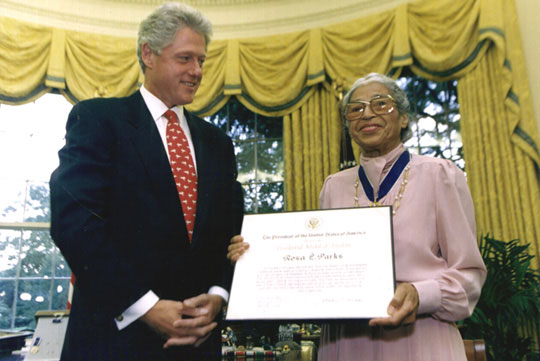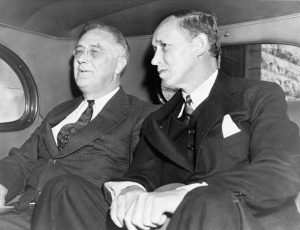Winner of the Fall 2017 StMU History Media Award for
Best Article in the Category of “Social History”
Rosa Parks, a strong, independent Civil Rights Activist, stood up for what she believed in. She’s known for her courageous acts dealing with the Montgomery Bus Boycott and the early phase of the Civil Rights Movement in the 1950s. But what happened in her life after these important events?
As we know, Rosa Parks was arrested for not giving up her seat on a Montgomery bus in 1955. She entered the bus, saw that it was quite crowded with one seat available located in the front “Whites Only” section of the bus. As more passengers boarded the bus, the bus driver demanded that he needed the seat Rosa was sitting in. She refused, and she was arrested.1

After her arrest on that December 1, 1955, Edgar Nixon, another Civil Rights Activist, paid her one-hundred-dollar bond. Immediately following her bail, she proceeded to file a lawsuit against the National City Lines bus company for its segregation practices. After weeks and weeks of this being an active case, the judges finally concluded. The court ruled bus segregation to be unconstitutional. The year-long Montgomery Bus Boycott finally came to a victorious end in Alabama in December 1956.2 During the boycott, Parks was invited by the United Auto Workers Union (UAW) to come to Detroit to speak to the union’s members. Local members of the UAW even raised the money to bring Rosa in. She stayed at the Garfield Hotel because blacks were not allowed to enter or reside at any downtown hotels. The mayor of the suburb of Dearborn had made his views on segregation clear: “Negroes can’t get in here. . . These people are so anti-colored, much more than you in Alabama.”3 Rosa Parks speech about the Montgomery boycott had a great impact on the UAW membership in Detroit.
Rosa Parks became an icon of the Civil Rights Movement. Her leadership skills and perseverance led to multiple doors opened for her, although at first she and her husband found getting employment difficult. In 1957, Rosa Parks moved to Detroit where her brother Sylvester lived. In 1964, Parks helped John Conyers campaign for Congressman, fighting for “jobs, justice, and peace” for Michigan’s first Congressional District. Certain laws prohibited some of Detroit’s residents from voting. Rosa was able to help Conyers win the election by obtaining the help of Martin Luther King. With King’s endorsement, Conyers won by a margin of 84%. Conyers then hired Rosa Parks as his secretary and receptionist, a position she held until 1988. Her daily tasks included dealing with issues such as, education, housing, and segregation.4

The Detroit that Rosa Parks moved to in 1957 was highly segregated. After World War II, Virginia Park, the historic district of Detroit where Parks lived, had become overcrowded, like many other sections of Detroit where African Americans were restricted. The district was further disrupted by the building of a highway, requiring the relocation of 43,000 citizens of Detroit, 70% of whom were African American. This led to increased frustration by Detroit’s African-American population, who were denied access to Detroit’s suburb housing, but told that Detroit was “colorblind” when it came to housing discrimination.5 When blacks attempted to move into the white suburban areas, realtors discouraged them and banks were very hesitant to make housing loans to them. If they succeeded, violence typically followed. By 1963, black citizens began to protest these closed housing practices. On June 23, 1963, Rosa Parks and Martin Luther King joined to lead Detroit’s Great March to Freedom to protest these unfair housing practices. This march drew a crowd over 200,000 people.6
Rosa also recognized that inner-city black students in Detroit, as elsewhere, didn’t receive the kind of preparation in their public schools to go to college. Growing up, Rosa herself barely had the opportunity to attend school, let alone college. With the assistance of Representative John Conyers, she raised government funds to open the Rosa L. Parks Scholarship Foundation. This Foundation gives Michigan high school seniors the opportunity to pursue a college education when they exemplify the ideals of demonstrating academic skills, community involvement, and economic need. This has been very beneficial for hundreds of students from poor Michigan communities since its founding in 1980. Although the process of creating this scholarship was very rigorous, Rosa was able to accomplish this goal.2
On October 24, 2005, Rosa Parks died from natural causes. She is still recognized to this day for her courageous acts.8
- Julie Bosman, Once A Stop for Rosa Parks (New York: The New York Times, 2016), 2-3. ↵
- Julie Bosman, Once A Stop for Rosa Parks (New York: The New York Times, 2016), 2-3. ↵
- Jeanne Theoharis, “The Northern promised Land that wasn’t: Rosa Parks and the Black Freedom struggle in Detroit,” OAH Magazine of History Vol. 26 No. 1 (2012): 23-24. ↵
- Jeanne Theoharis, “The Northern promised Land that wasn’t: Rosa Parks and the Black Freedom struggle in Detroit,” OAH Magazine of History Vol. 26 No. 1 (2012): 22-25. ↵
- Jeanne Theoharis, “The Northern promised Land that wasn’t: Rosa Parks and the Black Freedom struggle in Detroit,” OAH Magazine of History Vol. 26 No. 1 (2012): 24. ↵
- Jeanne Theoharis, “The Northern promised Land that wasn’t: Rosa Parks and the Black Freedom struggle in Detroit,” OAH Magazine of History Vol. 26 No. 1 (2012): 24. ↵
- Julie Bosman, Once A Stop for Rosa Parks (New York: The New York Times, 2016), 2-3. ↵
- Brinkley Douglas, Rosa Parks: A Penguin Life (New York: Penguin Books, 2000), 27-35. ↵



53 comments
Zeresh Haman
This is an amazing article, Rosa Parks is such an amazing person and in american history. Her strength is truly very inspiring and admirable. It is really interesting how we all know the story about Rosa Parks and how she strongly refused to give up her seat, but no one really knows her full story. It honestly is really interesting to learn about her whole life and what led up to that point. Very interesting and well written article.
Zeresh Haman
I have always loved reading about Rosa Parks, she is such an inspiring person and her strength is truly so strong. It is really interesting how we all know the story about Rosa Parks and how she strongly refused to give up her seat, but no one really knows her full story. It honestly is really interesting to learn about her whole life and what led up to that point. Very interesting and well written article.
Soteria Banks
Another win for Detroit. IM sorry but I’m from Detroit Michigan, and we have so much history that changed the world. all those civil rights movements. Detroit is one of the most strongest cities. all the riots, growing up i didn’t understand why it looked like that with all the burnt buildings you could just see the pain and misery. I’m proud that Rosa kept fighting even when their was no hope , she was a unselfish women, she cared for the young education and jobs for others. when i lived in Detroit we had t got to a catholic school because the publics school was so bad, Detroit still has some work to do but one day it will be the big dream city again.
Alexis Renteria
Rosa Parks and her story are well known by most if not all Americans. Her bravery to say no, and stand her ground showed the type of attitude blacks had to have in order to stop being discriminated against. There was no need to be treated differently from other people and so that needed to change. I liked the way you wrote this article because it makes you feel the frustration people were facing in Detroit at the time. Overall, this was an interesting and informative article, keep up the great work.
Christine Sackey
Rosa Park is so inspirational she fought her way for justice and did not let anyone or theory stand in her way. She was able to change the law by arrest. Park did not stop there but she marched with Martin Luther King Jr. to stand up for civil rights. Then she created a scholarship which has changed many people’s lives. She was a strong, independent, smart women who fight until the very end of life for more justice in this world.
Gabriela Serrato
Rosa Parks is definitely one of the first faces to come to mind when people think of the civil rights movement. It was extremely courageous of her to stand up in the face of discrimination and say that white people are in no way more valuable than black. It is still a concept today, where racism has become more obvious because the bigots of the country believe they do not have to hide their ways because of the current presidents encouragement of white pride. It has been over fifty years sine the brave acts of the civil rights movement, and I hope that the majority of the country, today, can continue to fight for equal treatment in this country.
Samman Tyata
Great article! I had never heard about Rosa parks before. However, it was interesting to know that she was an inspirational woman who made a great impact on the civil rights movement in the United States. Moreover, it is really inspiring that she spoke up for what she believed in no matter what the consequences might be. To sum it up, I really loved reading your article. It was a good read.
Thomas Fraire
Every year I remember learning about Rosa Parks, she is one of the most iconic civil rights members and just about everyone has heard of her. This article reflected that and to a very good story. I like how this article flowed it was very well formatted. Rosa Parks is a huge reason for progression in the USA, and we wouldn’t be where we are without her efforts.Congrats to you combine man!!!
Valeria Hernandez
Rosa Parks was an inspiration to many African American citizens during the Civil Rights Movement. This article does justice to her lifelong commitment to the fight for equal civil rights. The article has a wonderful story arc that displays some of the most important and memorable events in the life of this courageous and tenacious women. Her work and activism will forever be remembered and admired.
Michelle Falcon
Rose Parks was such as inspiration by standing up for what she believed in. What she did on the bus that day was historical and is still taught in schools through out the country today. However not many people know about what happened after myself included. This article showed us as readers the events that happened after words. Over all this was a great article.